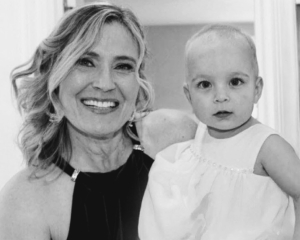
Dr. Kristen Hallett
I had the pleasure of sitting down with Dr. Kristen Hallett, a pediatrician working in Waterdown, Ontario (a community in the city of Hamilton), who is the inaugural recipient of the Pediatrics Section of the OMA’s (PSOMA) and Pediatricians Alliance of Ontario’s (PAO) “Pediatrician of the Season” for Summer 2025.
She was nominated by her colleague Dr. Moyez Ladhani, who said, “she provides comprehensive consultant care to all her patients, she advocates for the marginalized population,” and “she saw a growing need for gender affirming care in our region […] and trained herself to care for these children. She is now known in the region as an expert in gender affirming care.”
The following is a summary of my interview questions and her answers.
What does a typical day and week look like for you?
Dr. Kristen Hallett relocated from her Stoney Creek office to her current location in Waterdown in 2016, seeking a closer commute. She describes herself as a predictable person. She’s found a nice daily rhythm, starting with a walk with her dogs in the early morning hours, and then after preparing for her day, walking the short distance to work.
Her current office is called “Waterdown Pediatrics” and hosts clinic space for her, and Drs. Moyez Ladhani (Pediatrician), Nura Hawisa (Pediatrician), Stephen Leucht (Pediatrician), Surejini Tharmardinam (Pediatric Neurologist), and Jonathan Schweber (Pediatric Cardiologist).
Her typical work day runs from 9-6pm, though she also offers a clinic 2-8pm once a week, which she says helps to make space for all the pediatricians in her office, and also gives some flexibility for patients who may not be able to get to appointments during typical business hours.
Her practice includes general pediatric consulting, behavioral services, and most recently, a significant focus on gender affirming care, where she finds she gets most of her continuity. Dr. Hallett finds this continuity particularly rewarding.
Please tell us more about your Gender Affirming Care program?
Dr. Hallett says that around 2017-2018, Dr. Natasha Johnson (adolescent medicine at McMaster) and Dr. John Vandermeulen (pediatric endocrinology at McMaster), put out a call to pediatricians to help with gender and transition care. The goal was to provide community-based services outside of their their hospital clinic, which was overburdened and encountering long wait lists.
At the time, it was felt that there were 2 huge populations not being served well by this backlog. First were the prepubertal kids who would benefit from earlier assessment and support before Lupron would be indicated. The other group consisted of 16 to 18-year-old patients whose referrals were declined due to the wait list being long enough that they would age out before assessment. Drs. Johnson and Vandermeulen hoped a pediatrician could help, especially with these groups.
Dr. Hallett loves being an advocate for patients, especially those who “don’t have a voice.” She says, “This is her calling,” which also explains some of her prior work in Child Maltreatment. In addition, Dr. Hallett says her background in pharmacy made her comfortable with the medical management. These two factors; her underlying expertise and her draw to advocate made her very confident with the idea of providing this care. She thus met with Drs. Johnson and Vandermeulen and learned all the pathways needed to provide such care in her office.
Most of her initial referrals in this area were directed to her primarily by the Gender Clinic at McMaster. This built up her referral base, and the rest has grown through word of mouth, including getting a lot of traction with the Hamilton Trans Health Coalition.
With her growing expertise, she has devliered numerous talks on Gender Affirming Care, including in Orangeville, other parts of Rural Ontario, and at our own Practical Pediatrics Ontario (PPO) 2023. Education has also been in the form of mentoring students, as she has had a number of physician assistant and nurse practitioner students come through her office.
Dr. Hallett admits that her work is very resource intensive. She does all of the care herself, including her patient’s injections. She reports that most of her consults end up being around 90-120 minutes as each assessment includes extensive time with the child in confidence, time with the family and child, and then further discussion, with education and proper consent about treatment options.
Dr. Hallett acknowledges that providing gender affirming care makes up a significant portion of her patient population. She has treated over 200 patients in the last 7 years. Most remarkably, she loves the opportunity to have longer-term relationships with her patients in this realm. She says, “I wish there were a way where I could take a photo of how the kids walk into my office the first time I meet them, and then how they leave several years later. It’s not just their appearance. It’s how they walk, and how they exert confidence and satisfaction. For so many of them, there’s so much shame or sadness or anxiety, and then they’re just like different people. You know? And it’s gratifying in that way.”
What are some lessons learned from the community-based Gender Affirming Care program you developed?
Dr. Hallett says she has gotten better at scheduling her injections and clinics. This is all done through trial and error. She has also streamlined her Lupron treatments, moving sooner to 12-week injections, given more experience and to address patient preference.
She also recommends coordinating care with family doctors. She has found that about 10% of her population is out of region (Brantford, Niagara, etc.), therefore, it has become essential to coordinate with these family doctors to ensure patients access appropriate regional supports in addition to the Gender Affirming Care they receive from her.
She does advise being careful with parents who might be abusive if they disagree with your approaches. To this end, she has found it is a good idea to have a support group, people with expertise or similar experiences you can reach out to. She found this naturally with the adolescent medicine team at McMaster.
What tips would you offer to pediatricians hoping to innovate in community pediatrics?
Dr. Hallett thinks you need to find a passion in your life, and you just need to go for it. She advised that sometimes doors close for various reasons; either you close them, or they’re closed for you, but then other doors open.
She suggests being willing to talk to other people in your community to optimize your approach to various problems, and don’t try to solve everything on your own.
Another idea is to approach specialists and ask about shadowing to learn their processes. She advised that she has had success even just cold calling, as most people are eager to share their work and expertise. She acknowledges that these sorts of clinical activities come at a cost (in terms of taking time away from your practice), but it can be helpful to think of it as an investment in yourself and for your patients.
Thank you Dr. Hallett for the work you are doing to advance the health and wellbeing of children and adolescents in Ontario, for seeing challenges that need addressing, and innovating to improve care for marginalized patients.
Congratulations on your award as the “Pediatrician of the Season” for Summer 2025, and we hope to see you at PPO 2025!
If reading this profile made you think of another amazing pediatrician doing outstanding work in their community (clinical, education, leadership, advocacy, etc.), please consider nominating them for the Pediatrician of the Season, Fall 2025 by sending a letter of nomination to pedsontario@gmail.com.

